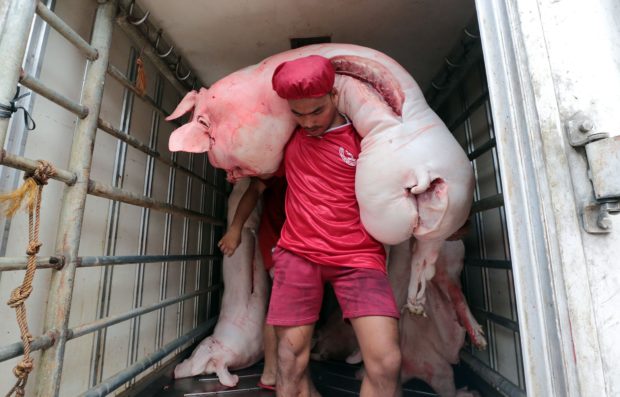
SAFE TO EAT Inspected pork is delivered to meat vendors at Commonwealth Market in Quezon City on Wednesday, August 21, 2019. INQUIRER file photo / GRIG C. MONTEGRANDE
MANILA, Philippines — The House agriculture and food and local government panels are looking to focus its investigation on the processed meat industry as Congress further investigates the African swine fever (ASF) outbreak in the country.
House agriculture panel chairperson and Quezon 1st District Rep. Wilfrido Enverga on Wednesday said he wants to probe meat processors amid reports of massive pullout of processed meat products by local manufacturers in local markets, particularly in Northern Luzon.
Retail industry sources claim that major food processors are pulling out their products from supermarkets, probably in avoidance of ASF detection, Enverga said.
“In the succeeding hearings on ASF, the committee will definitely look into the matters relating to processed meats. We have to look into how they are regulated by the concerned agencies,” he said in a statement.
The lawmaker said the panels would specifically look into how the National Meat Inspection Service (NMIS) and Food and Drug Administration (FDA) are handling the issue. The said agencies had been invited to the next hearing scheduled next week.
He added that all processed meat products in the market should have undergone testing and strict measures should have been implemented to prevent the spread of ASF virus.
The national government is currently implementing the 1-7-10 protocol, where ASF-afflicted pigs and others within the one-kilometer radius are culled. Those within the seven-kilometer radius have limited movement, while pigs in the 10-kilometer radius are strictly monitored.
It has also put up a crisis management team to address the ASF outbreak in the country.
During the recent joint hearing of agriculture and local government panels, the Bureau of Animal Industry (BAI) Director Ronnie Domingo revealed that ASF cases in the country have already gone down in November.
ASF cases are seen to further decrease early next year as the country enters the dry season, Domingo added.
However, Agriculture Undersecretary Ariel Cayanan pointed out how the ban imposed by local government units against live hogs and pork products has severely affected the industry.
He appealed to local chief executives to lift their bans and to cooperate with the national government and the hog industry in regulating live hogs and pork products.
“We have issuances (so) that they could be guided upon, not necessarily dictated upon, but guided upon. Again, there (is) already progression (in communicating with these LGUs) and we hope that some of them, for those who have issued restrictive and constrictive (issuances), should be actually following this,” Cayanan said during the hearing.
“Let us agree on one condition that our eagerness to protect, the intention is good. [But] the process should not actually violate… the privileges of others,” he added, addressing governors and mayors.
Hog raisers made a similar plea to local government units.
Anna Lisa Uy, of the Pork Producers Federation of the Philippines, wants the immediate implementation of the DA’s zoning plan, noting how the LGU’s bans are hurting their business.
“Now that borders are being closed, it’s getting difficult for hog raisers to sell their hogs. The other provinces that are non-producing are finding it hard to produce their own hogs,” she said.